
Guests
- Edwidge DanticatHaitian-American novelist.
As the death toll from Hurricane Matthew continues to rise to more 330, across the country some 15,000 have been displaced and 350,000 more are in need of assistance. The storm knocked out most electricity and phone service across the country. It also washed out a major bridge connecting southern Haiti to the rest of the country. Aid organizations are warning that food and water is scarce. We get reaction from Haitian-American novelist Edwidge Danticat, who says the storm has caused what will be an “ongoing disaster” in the poorest country in the Western Hemisphere, which is still recovering from a devastating earthquake six years ago that left more than 300,000 dead and twice as many people displaced.
Transcript
JUAN GONZÁLEZ: We begin today’s show in Haiti, where the death toll from Hurricane Matthew continues to rise. More than 330 bodies have been discovered so far, as waters recede from the most powerful storm to hit the Caribbean in a decade. Across the country, some 15,000 have been displaced and 350,000 more are in need of assistance. The storm knocked out most electricity and phone service across the country. It also washed out a major bridge connecting southern Haiti to the rest of the country. Aid organizations are warning that food and water are scarce.
AMY GOODMAN: Haiti is the poorest country in the Western Hemisphere, still recovering from a devastating earthquake six years ago that left more than 300,000 people dead and twice as many displaced.
For more, we’re joined by Haitian-American novelist Edwidge Danticat. She’s speaking to us from Miami, Florida. Her new piece for The New Yorker is headlined “Facing Hurricane Matthew.”
Edwidge, welcome back to Democracy Now! From one hurricane target, in Florida, to another, Haiti, can you talk about what you understand has happened in your home country, in Haiti?
EDWIDGE DANTICAT: Good morning, Amy. Good morning, Juan. Thank you so much for having me once again.
What I understand and what the world is starting to see is that parts of Haiti have been decimated. The images that were just emerging yesterday from the south, from Jérémie, from Port-Salut, show that in some towns—in Jérémie, for example—something like 90 percent-plus of the houses are either flattened or have lost their roofs. There was an enormous sea surge, so the sea came in pretty far inland. And that, of course, means that a lot of vegetation has been lost, a lot of farming. And there are places where it was close to harvest time, so that harvest is gone. And livestock, for which people, especially people in rural areas, the livestock is like their bank account, and so much of that is washed away.
So it’s a case of extreme devastation, that started—we started getting very low numbers in terms of the death tolls, because there was no access to these areas. And there are areas to which there is still no access. So, it’s a very, very dire and grave situation—equal, for some of the towns affected, to the earthquake in 2010.
JUAN GONZÁLEZ: And, Edwidge, what about that—how has the government been able to cope, given the fact that it’s still—Haiti is still recovering from the earthquake of 2010 and also from the cholera epidemic that has continued to rage there?
EDWIDGE DANTICAT: Well, I’m not in Haiti at the moment, but I’ve been following very closely on the radio. I think, like—as in the case of 2010, and perhaps even more so now, I think no government is really, least of all the Haitian government, which is a provisional government, is prepared for something like that fully. It was so much more drastic. Haiti has not been hit by a storm like this in decades.
So, I think the—you know, to what I’ve seen, the first job has been to assess even the damage. The interim president yesterday was able to do a flyover, I believe, with the U.S. Coast Guard and actually see the devastation that we are now all going to see, and I think there’s going to be a lot of coordination needed to reach the most remote areas. I think that, unlike the earthquake, which was primarily in an urban area and much more easily accessible, now you have this devastation in some very remote areas that I fear that it will take the government or others who—international partners or aid organizations, local and international, that it will take them a lot longer to get to people who are very desperate, because, for example, people in rural areas are very—they have a strong interconnection and sometimes really have to rely very much on themselves, but their staple of their survival has been wiped away, and it’s very hard to now get to them. So that’s going to be, I think, the biggest challenge, because right now the only way to get to some areas to even assess what’s happening is by air, and we don’t have access to a lot of airplanes and helicopters and so forth. And where would they land, in some cases?
So, the first, I think, focus is—that I’ve noticed that they’re working on—is the roads, to make these places accessible so that people who are willing to help, who are able to help, can actually access those places and give people their—just provide immediate needs, like food and water, to try to get them to the next place where they can actually start to rebuild their lives.
AMY GOODMAN: Edwidge, how does poverty affect, intensify what has taken place? Now, we—something like 330 bodies have been found as the water recedes. Haiti is the poorest country in the Western Hemisphere.
EDWIDGE DANTICAT: Well, it’s going to aggravate the poverty, and extremely. I mean, it’s going to get so much worse. This is not an immediate disaster. It’s not a today disaster. It’s an—it’s going to become an ongoing disaster.
And the first thing that will be affected, certainly, you will have an increase in the cholera, which was—which has become endemic and epidemic now, since it was introduced in Haiti by the U.N. peacekeepers, which they admitted recently. So the cholera—you will have a spike in the cholera, because there is less access now to clean water. Even the water sources have been eroded by the flooding.
And the food—food insecurity will certainly rise, because not only are people’s immediate supply reduced, but their ability now to plant for the next harvest, to use that—you know, people who farmed, and we have a lot of subsistence farmers, and their resources have just been wiped out.
And so, I think you will have a—it’s a very—it’s a long-term disaster, and that it’s something also people who are now going to go to seek to help should think about, not just the immediate effects of this, but it will certainly, certainly, most certainly, deepen the poverty, especially rural poverty, which has always existed, but it’s the fact that people’s few resources now have been wiped away and that they have to rebuild a home and that they have to now find other ways to send their children to school. I think it will—it will certainly aggravate the poverty that has already existed. Now, also you have to remember that this area, the south, which is an area that I go to often, that I know quite well, was going through a drought for quite a few years before this happened. So it’s really going to compound the difficulties of people’s lives.
JUAN GONZÁLEZ: And, Edwidge, you’re speaking to us from Miami, where there is a large Haitian-American community, some of the poorest residents of Miami, and now they’re also facing, as the whole of Florida is, the Hurricane Matthew. As happened—as has happened with other storms, it’s the poorest folks in every city that end up suffering the brunt of these megastorms.
EDWIDGE DANTICAT: Yes, which is what we’re seeing in Haiti. I think people, when they talk about Haiti sort of as a—where all these things are directed towards us, I mean, it’s—what’s happening in Haiti is showing also how the poorest, the developing nations, really are the ones that carry the brunt of things like climate change and all of these effects.
In Florida, we were, thankfully, in South Florida, where there is a very large Haitian population. We were, thankfully, spared the hurricane here. It was expected to—it went from being expected to be a tropical storm to going from a Category 4 to 5. But, thankfully, it’s bypassed us, and it’s gone up north. And it’s even not as brutal as it was expected to hit up north.
So, we were spared here, which—which, thankfully, will allow people—and a lot of us here have family in Haiti, some family, because the south was cut off from communications, that we haven’t been able to reach. It’s now—the fact that this storm has bypassed us will allow a lot of Haitian families here to now focus a little bit easier on their—on helping family back in Haiti and seeing what we can do for our loved ones and friends there.
AMY GOODMAN: We’re about to talk more extensively about climate change relationship with this hurricane. But I wanted to ask you, Edwidge, about the lack of discussion about climate change, so often affecting countries that have not been the source of, the cause of climate change, but are so deeply affected by it, like your own—like your own, Haiti.
EDWIDGE DANTICAT: Well, absolutely. I think that discussion of climate change has to involve that aspect of it, because—and probably because these developing nations don’t often have a voice at the table in this conversation of climate change, but end up being, as you said, the people who bear the brunt of it. And it’s like people should see this storm as a kind of a canary in the mine, because these storms are getting bigger and more frequent and having more devastating effects. And they are affecting people who are using the fewest of the world’s resources, but are getting the brunt of the aftermath of these storms. But we also have to think so goes all these—you know, New Orleans, I thought Katrina would have taught us so much 10 years ago. But that discussion of climate change always excludes these events as sort of oddball events or once in a lifetime. But more and more, we are seeing these storms and people actually suffering, as they are now in Haiti, as a result of climate change.
AMY GOODMAN: We want to thank you so much for being with us. Edwidge Danticat is a Haitian-American novelist. She’s speaking to us from Miami, Florida. Her new piece for The New Yorker, which we’ll link to at democracynow.org, “Facing Hurricane Matthew.”
This is Democracy Now! When we come back, where is climate change in the discussion of this devastating hurricane that has devastated the Caribbean and now making its way up the Southeast coast of the United States? Stay with us.

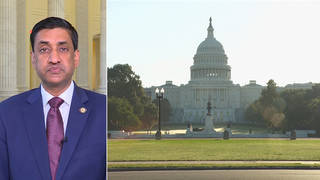
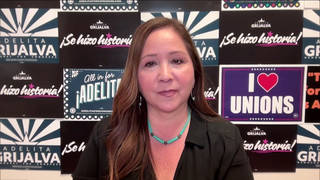
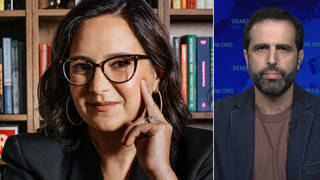
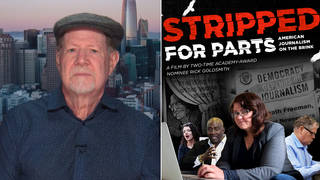





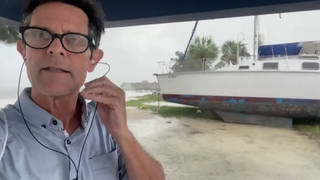

Media Options